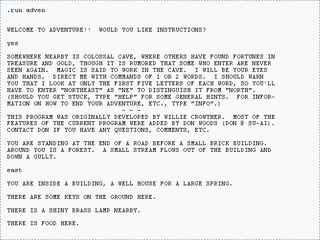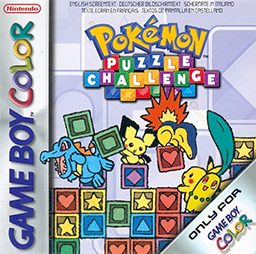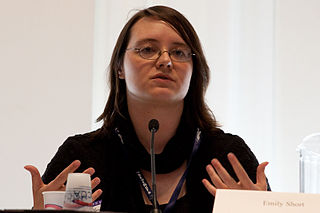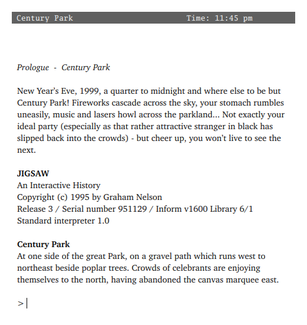
Interactive fiction, often abbreviated IF, is software simulating environments in which players use text commands to control characters and influence the environment. Works in this form can be understood as literary narratives, either in the form of interactive narratives or interactive narrations. These works can also be understood as a form of video game, either in the form of an adventure game or role-playing game. In common usage, the term refers to text adventures, a type of adventure game where the entire interface can be "text-only", however, graphic text adventures still fall under the text adventure category if the main way to interact with the game is by typing text. Some users of the term distinguish between interactive fiction, known as "Puzzle-free", that focuses on narrative, and "text adventures" that focus on puzzles.
The Interactive Fiction Competition is one of several annual competitions for works of interactive fiction. It has been held since 1995. It is intended for fairly short games, as judges are only allowed to spend two hours playing a game before deciding how many points to award it. The competition has been described as the "Super Bowl" of interactive fiction.
Inform is a programming language and design system for interactive fiction originally created in 1993 by Graham Nelson. Inform can generate programs designed for the Z-code or Glulx virtual machines. Versions 1 through 5 were released between 1993 and 1996. Around 1996, Nelson rewrote Inform from first principles to create version 6. Over the following decade, version 6 became reasonably stable and a popular language for writing interactive fiction. In 2006, Nelson released Inform 7, a completely new language based on principles of natural language and a new set of tools based around a book-publishing metaphor.
Text Adventure Development System (TADS) is a prototype-based domain-specific programming language and set of standard libraries for creating interactive fiction (IF) games.
Adam Cadre is an American writer active in a number of forms—novels, screenplays, webcomics, essays—but best known for his work in interactive fiction.

Galatea is an interactive fiction video game by Emily Short featuring a modern rendition of the Greek myth of Galatea, the sculpture of a woman that gained life. It took "Best of Show" in the 2000 IF Art Show and won a XYZZY Award for Best Non-Player Character. The game displays an unusually rich approach to non-player character dialogue and diverts from the typical puzzle-solving in interactive fiction: gameplay consists entirely of interacting with a single character in a single room.
The XYZZY Awards are the annual awards given to works of interactive fiction, serving a similar role to the Academy Awards for film. The awards were inaugurated in 1997 by Eileen Mullin, the editor of XYZZYnews. Any game released during the year prior to the award ceremony is eligible for nomination to receive an award. The decision process takes place in two stages: members of the interactive fiction community nominate works within specific categories and sufficiently supported nominations become finalists within those categories. Community members then vote among the finalists, and the game receiving a plurality of votes is given the award in an online ceremony.

Pokémon Puzzle Challenge is a video game for the Game Boy Color. It is based on Panel de Pon, only with characters from the Pokémon franchise. The characters in Pokémon Puzzle Challenge are based on those in the Gold and Silver games, while those in Pokémon Puzzle League—its Nintendo 64 equivalent—were based more on the anime characters. However, the game is also focused around beating the Johto leaders in a puzzle challenge in Johto region. The game play mode is divided into 1 Player, 2 Player, and Training. The game was later released on the Nintendo eShop on November 6, 2014.
The Frenetic Five is a series of three text adventures about a band of superheroes, all made with TADS version 2 and distributed as freeware. The series was created by Neil deMause for the Interactive Fiction Competition.

Emily Short is an interactive fiction (IF) writer.
Jon Ingold is a British author of interactive fiction and co-founder of inkle, where he co-directed and co-wrote 80 Days, and wrote Heaven's Vault and Overboard!. His interactive fiction has frequently been nominated for XYZZY Awards and has won on multiple occasions, including Best Game, Best Story and Best Setting awards for All Roads in 2001. Ingold's works are notable for their attention to the levels of knowledge that the player and player character have of the in-game situation, with the effect often depending on a player who understands more than the character or vice versa. Ingold has also written a number of plays, short stories and novels.

Anchorhead is a Lovecraftian horror interactive fiction game, originally written and published by Michael S. Gentry in 1998. The game is heavily inspired by the works and writing style of H.P. Lovecraft, particularly the Cthulhu mythos.
Vespers is an interactive fiction game written in 2005 by Jason Devlin that placed first at the 2005 Interactive Fiction Competition. It also won the XYZZY Awards for Best Game, Best NPCs, Best Setting, and Best Writing.

Jigsaw is an interactive fiction (IF) game, written by Graham Nelson in 1995.
I-0, also known as Interstate Zero, is a piece of anonymous interactive fiction about the adventures of a teenage girl hitch-hiking on an Interstate Highway. The main character is Tracy Valencia, a 17 year old college student who is on her way home for Thanksgiving when her car breaks down, leaving her stranded in the middle of a scorching desert.
Earth and Sky is an interactive fiction trilogy written and produced by American author Paul O'Brian about the adventures of a brother and sister who gain superpowers while searching for their lost parents. Games in the series have won awards in the annual Interactive Fiction Competition and received an XYZZY Award.

Scribblenauts is an emergent puzzle action video game developed by 5th Cell and published by Warner Bros. Interactive Entertainment for the Nintendo DS. The game was released in 2009 in all regions except Japan, and in 2011 in Japan as Flash Puzzle: Maxwell's Mysterious Notebook by Konami. It is the third Nintendo DS video game made by 5th Cell, the first two being Drawn to Life and Lock's Quest. The objective of Scribblenauts, as implied by its catchphrase "Write Anything, Solve Everything", is to complete puzzles to collect "Starites", helped by the player's ability to summon any object by writing its name on the touchscreen. The game is considered by its developers to help promote emergent gameplay by challenging the player to solve its puzzles within certain limitations or through multiple solutions.

Violet is a work of interactive fiction by American author Jeremy Freese. It is a one-room puzzle game.

Jami is a SIP-compatible distributed peer-to-peer softphone and SIP-based instant messenger for Linux, Microsoft Windows, OS X, iOS, and Android. Jami was developed and maintained by the Canadian company Savoir-faire Linux, and with the help of a global community of users and contributors, Jami positions itself as a potential free Skype replacement.
Tag: The Power of Paint is a 2008 puzzle-platform game. The game was developed for Microsoft Windows by Tag Team, a group of students from the DigiPen Institute of Technology. The game's core mechanics is the use of a special paint sprayed from the player's paint gun to impart physical properties to surfaces, which, in turn, affect the user's movement. Tag won the Independent Games Festival Student Showcase award in the same year. The project team was hired by Valve, using the concepts of Tag as new puzzle elements in their game Portal 2.








